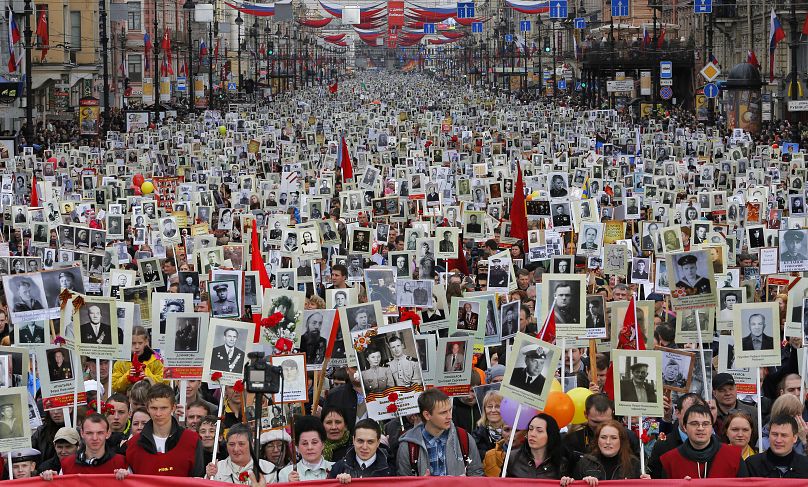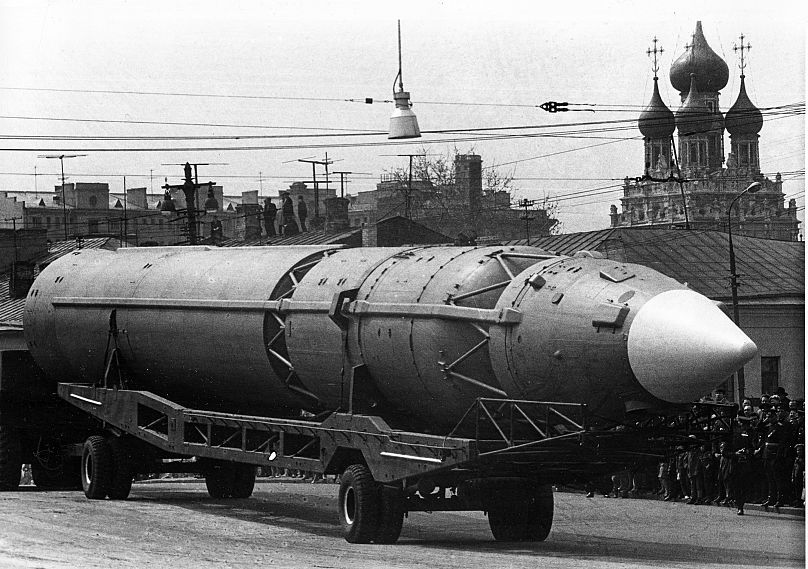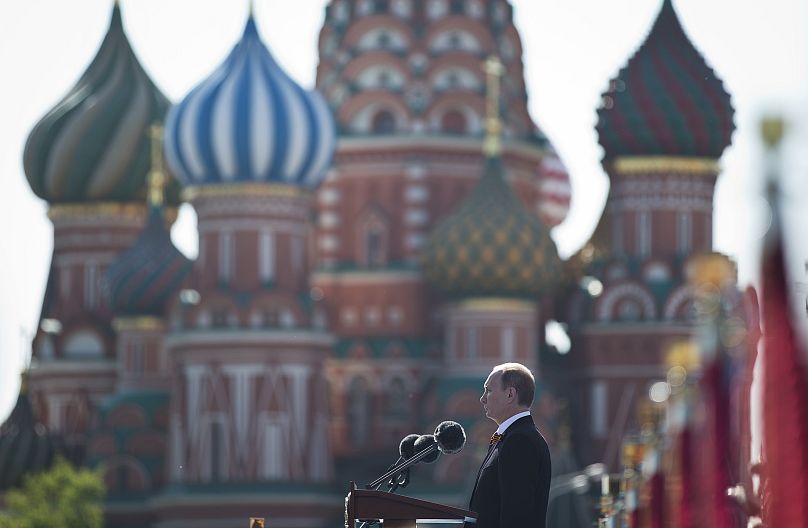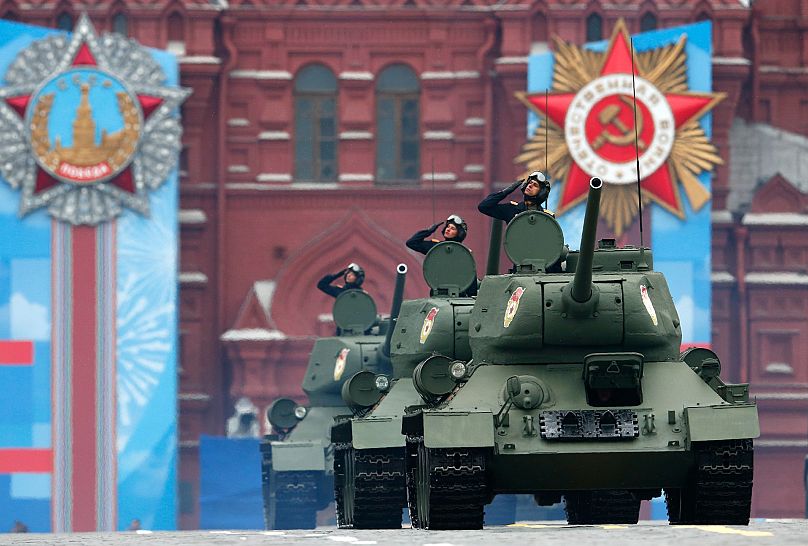Euronews' guide to Victory Day in Russia
This article was first published on 9 May 2022.
 ADVERTISEMENT
ADVERTISEMENT
 ADVERTISEMENT
ADVERTISEMENT
Russia's Victory Day celebrations on Monday, 9 May are set to take on greater significance than normal amid Moscow's invasion of Ukraine.
But which victory does it toast? What happens on the day? How do Moscow and the West view it? And how has the parade evolved over the years?
What is Russia's Victory Day?
The day celebrates the Soviet Union's victory over Nazi Germany in World War II.
It includes military parades in Moscow and more than two dozen Russian cities. It will involve nearly 65,000 people, 2,400 types of weapons and military equipment and more than 460 planes, according to Russian Defense Minister Sergei Shoigu.
Ukraine's intelligence service has claimed Russia is also planning a victory parade in Mariupol, Ukraine, which has been besieged by Russian troops.
What happens on the day?
After months of nightly rehearsals, where military vehicles keep Moscovites awake until the early hours, the parade kicks off at 10:00 am.
Then 14,000 troops, hundreds of military vehicles and aircraft pass through (or over) Moscow's Red Square, where they are normally inspected by the Russian leader, senior army figures and foreign leaders.
Several speeches by Vladimir Putin about WWII -- or the Great Patriotic War as it is called in Russia -- follow.
A fly-past over St Basil's Cathedral will include supersonic fighters, Tu-160 strategic bombers and, for the first time since 2010, the Il-80 "doomsday" command plane, which would carry Russia's top brass in the event of a nuclear war, Russia's defence ministry said.
Eight Mig-29 fighter jets are expected to fly over forming the letter Z -- a symbol of Russia's military campaign in Ukraine.
On the ground, Russia will be displaying its nuclear-capable hardware, including the Yars intercontinental nuclear missiles and Iskander short-range ballistic missile systems.
One thing to watch is who stands on the podium with Putin. Since the Soviet times, how close commanders stand to the Russian leader, who is missing, or what foreign leaders attend are huge political signals.
"It shows who is up and who is down," Professor Michael Clarke, associate director of Exeter University's Strategic Studies Institute, told Euronews.
In April, Russian presidential spokesman Dmitry Peskov said no foreign guests would be invited to this year's parade, according to the TASS news agency.
The day comes after Russia's war sparked Europe and the US to impose unprecedented sanctions on the country, rendering it a pariah state in much of the West.
Also on 9 May, parades take place on a smaller scale in dozens of cities across the nation as well as the so-called "Immortal Regiment" march, which involves people carrying photos of veterans or family members who died in the war.
This year, participants of the processions are also encouraged to bring photos of those who died fighting in Ukraine.
What’s the history of the parade?
Like Europe's VE Day on 8 May, the Victory Day Parade was founded in 1945 to celebrate the defeat of Nazi Germany in WWII.
Yet the parade does "not simply commemorate the end of the war," explained Prof Clarke. "It represents Russia's defeat over Nazism. As the war was a 'near-death experience' for the Soviet Union, the parade marks the deliverance -- and so endurance -- of Russia."
Dr Stephen Hall, lecturer in International Relations and Russia at Bath University, told Euronews that WW2 was the greatest achievement of the Soviet Union.
He said with Putin positioning Russia as a continuation of the USSR, the parade "gives legitimacy to the current leadership".
How have the parades changed over the years?
The parade has become more frequent. The first one was in 1945 and, until the 1990s, it was only held on special anniversaries of WW2, 1965 and 1985.
In 1995, under former Russian President Boris Yeltsin, the parade became yearly.
"If I am being cynical, this was a way to get Russian populists onside," explained Dr Hall. "Yelstin had a terrible approval rating. It was the time of the First Chechen War (1994 - 96) and Russia was losing, and losing badly. One way to restore confidence in the government was the Victory Day Parade."
Victory Day has also become more militaristic.
In the 1990s, it featured workers and civilians, but following NATO's expansion into former Soviet states on Russia's fringes throughout the 2000s, said Dr Hall, the parade's military element increasingly took centre stage, with rockets and missiles becoming a major focus.
How does Russia see Victory Day?
Putin has repeatedly likened the war in Ukraine to the challenge the Soviet Union faced when Adolf Hitler's Nazis invaded in 1941.
"The attempt to appease the aggressor on the eve of the Great Patriotic War turned out to be a mistake that cost our people dearly," Putin said on 24 February when he announced what he called a special military operation in Ukraine.
"We will not make such a mistake a second time, we have no right."
Putin casts the war in Ukraine as a battle to protect Russian speakers there from persecution by Nazis and to guard against what he terms the US threat to Russia posed by NATO enlargement.
Ukraine and the West dismiss the fascism claim as nonsense and say Putin is waging an unprovoked war of aggression.
The Soviet Union lost 27 million people in World War Two, more than any other country, and Putin has railed in recent years at what Moscow sees as attempts in the West to revise the history of the war to belittle the Soviet victory.
Is Russia’s version of WWII history controversial or challenged?
Putin has been revising Russian history for decades, claimed Prof Clarke. Since its 2008 invasion of Georgia, he said Putin has voiced a romantic version of Russian nationalism. One where the country is -- and should be -- accorded great power status in Europe.
At the Victory Parade, Putin used to praise Russia and its allies for their common victory in WW2, he said, but "the way Putin speaks now, you would think Russia was the only country that fought".
The Soviet Union bore the brunt of causalities during WWII, with an estimated 8 to 11 million military deaths, compared to 400,000 US soldiers.
As he re-writes Russian history, Prof Clarke claimed Putin is positioning himself alongside Peter the Great, Catherine the Great and Stalin as the fourth leader of a "great and powerful" Russia. To achieve this vision, he wants to capture territory that once formed the historic area of Novorossiya, such as south and eastern Ukraine.
What is the purpose of the parade?
The parade is a symbol of what Russia wants to project to the world, said Prof Clarke, rather than how powerful the country's army is. While a particular weapon might be displayed, this does not indicate how much of it Russia has, he added.
"Everyone is looking at what drives past," Prof Clarke said. "The Russians want to show off their new tech. Victory Day is a series of messages. Putin never misses the opportunity to remind the world that Russia is a nuclear power."
But Dr Hall believes the parade should be taken with a pinch of salt.
"For a long time in the West, we believed Russia's military was stronger than it was," he said. "Very few people actually knew" and a "lot of armchair warriors" benefited from making exaggerated claims about Russian arms.
"As we have seen in Ukraine, there is a big difference between the parade and what happens in a war setting," said Dr Hall.
Why is this year’s parade particularly significant?
With Russia "clearly underperforming" in Ukraine, said Prof Clarke, Putin will likely try and use the parade to build public confidence in the military. He expects the parade to be more militaristic and the speeches more assertive than ever before.
"Putin is realising the difficult position he is in Ukraine," said Prof Clarke. "He will want to reassure the Russian people their massive military machine will not lose."
53 per cent of Russians "strongly" support and 28 per cent "somewhat" support their country's military operation in Ukraine, according to survey data by the Chicago Council on Global Affairs.
As the Ukraine war has grown harder for Russia, Prof Clarke added that Putin's rhetoric has escalated. After claiming Russia is "denazifying" Ukraine, Putin now says Russia is fighting a European Nazism backed by American imperialists. At the parade, Prof Clarke anticipates a speech that Russia is engaged in a Patriotic War 2.0, where the country is fighting for its very survival.
Putin maintains that Russia's "special military operation" is needed to "demilitarise" a hostile state on its border, and protect Ukraine's Russian-speaking minority from bullying and genocide by the government in Kyiv.
Believing that Russia may need to mobilise nationally to win the Ukraine war, Prof Clarke said Putin may make aggressive speeches toward the outside world at the parade to "stoke up" the public. This, he said, is to prepare them for possible troop call ups and bigger economic sacrifices as the war drags on.














